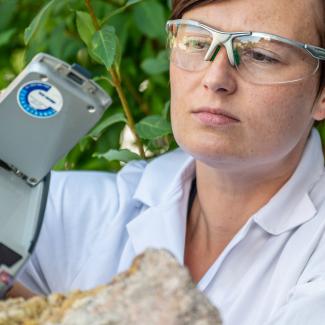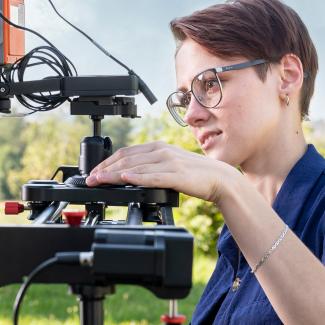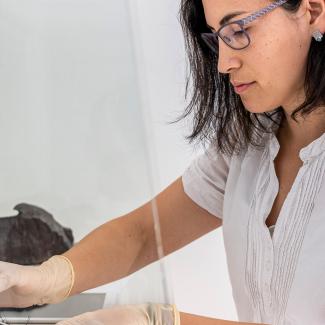Geoengineering
How must dams be founded on the earth in order to withstand flooding?
How can the supply of energy and industrial raw materials of all kinds be secured for mankind?
And what role can the subsurface play in the energy transition?
These and other questions about the sustainable and environmentally friendly use of the earth's crust are addressed by students on the Geoengineering degree programme. Well-trained specialists are in demand everywhere.
The utilisation requirements of the near-surface subsurface continue to increase in modern society. In addition to typical uses such as groundwater extraction, the extraction of raw materials including energy resources, storage facilities, landfills and underground repositories, underground spaces are also increasingly needed for other uses and infrastructures. For the expansion of renewable energies and the decarbonisation of the energy industry, which are necessary to achieve climate protection targets, the storage of energy sources such as hydrogen, heat and other energy from renewable sources will be required to a greater extent in the future.
The degree programme begins with the foundation course, which covers general scientific principles as well as special geoengineering modules such as reservoir theory, surveying technology and geomechanics, as well as legal and business fundamentals.
In the main course, students choose from one of four fields of study:
- Mining
- Geoenergy Systems
- Geomonitoring and Mine Surveying
- Geotechnology
In the chosen field of study, skills and knowledge are developed and specialised according to personal interest. Part of the diploma programme is a work placement of 120 shifts in the 7th semester, so that our students gain relevant work experience, establish important relationships with future employers and become familiar with typical applications and areas of responsibility in their future profession. The demand for our graduates from the geoengineering degree programme is high on the national and international labour market and the employment opportunities are diverse. A particular advantage in Freiberg is the practical, university-based teaching and the excellent facilities, including the university's own research and teaching mine "Reiche Zeche".
Students should acquire the ability to recognise and assess scientific-engineering, physical, geotechnical, technological, economic, legal and ecological relationships in the context of the safe, ecologically and economically sustainable use of the earth's upper crust and to evaluate their economic and ecological impact in particular, as well as to contribute to the development of holistic, sustainable technologies. They will be able to communicate technical interrelationships, i.e. to present them to experts and the public. With these skills, they will be able to implement projects along the entire value creation cycle from exploration, project development and planning, regional planning procedures, operational management of the deposit to recultivation, remediation and subsequent use of areas of the geosphere that have been utilised.
- Faculty
-
Faculty of Geosciences, Geoengineering and Mining (Faculty 3)
- Degree
-
Diploma (Dipl.-Ing.)
- Standard period of study
-
10 Semester
- Part-time possible
-
No
- Start of studies
-
Winter semesterSummer semester
- Admission requirement
-
Abitur or subject-specific higher education entrance qualification or an entrance qualification recognized as equivalent
Language requirement
- Application: with at least B1 level German
- Admission to the degree program: with C1 level German (e.g. DSH-2)
- language courses and DSH exam at TUBAF
- Course language
-
German
Geotechnology, e.g. at tunnelling or utility companies
Machinery industry, e.g. development, field tests, and use of new extraction and production technologies
Raw material exploration, e.g. investigation and exploration of ore and energy raw material deposits
Raw material extraction, e.g. Construction, optimization and management of mines, drilling rigs, and storage facilities
Construction sites, e.g. site management, expert opinions, optimization tasks
Public service, e.g. at mining authorities, ministries
Research, e.g. deep sea and space mining, autonomous systems, deep geothermal energy, offshore technology
Interests and skills you should bring with you
- Enjoyment of excursions above and below ground
- Excitement for technical procedures and processes, construction and experimentation
- Curiosity about new technologies, programming, 3D modeling, and simulation
- Interests in mathematics, physics, and the Earth system


